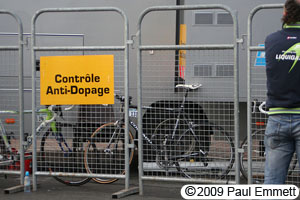As of January 1, 2010 the International Cycling Union (UCI) has taken another big step towards deterring cheating in cycling. Now new provisions of the UCI Anti-Doping Rules impose financial penalties on riders who are suspended by their National Federations. Not only that, but Article 326 of the UCI Anti-Doping Rules ensures that the fine correlates with the net annual income of any rider committing an offence, but only if sanctioned by a suspension of two years or more. Presumably, the two year suspension minimum for the penalty will filter out any infractions that are deemed “accidental” or “less serious”.
 Most recently Italian Danilo Di Luca was handed down a 280,000 euro fine for his two doping positives in the 2009 Giro d’Italia. Di Luca’s compatriot Maurizio Biondo was also hit with a fine of 13,750, and Spaniard Inigo Landaluze now has a 27,300 euro fine as a result of his sanction.
Most recently Italian Danilo Di Luca was handed down a 280,000 euro fine for his two doping positives in the 2009 Giro d’Italia. Di Luca’s compatriot Maurizio Biondo was also hit with a fine of 13,750, and Spaniard Inigo Landaluze now has a 27,300 euro fine as a result of his sanction.
The new fine structure, which equals 70% of a rider’s yearly salary, will go a long way towards ensuring that the penalties handed out assign the same financial burden to a domestique as it would to a star rider earning a six figure income.
Over the past several years cycling has worked diligently towards eradicating the scourge of doping from the sport. In the process, cycling has “lost a few” along the way in terms of big sponsors and teams. During the process, we’ve also seen several key figures go beyond what would be expected, with names like Andy Rihs and Bob Stapleton along with sponsors Barloworld and Milram, all doing more than their part keep the sport’s tenuous financial situation a little bit healthier.
Despite all of the bad press that has circulated since the Operación Puerto scandal broke in 2006, it’s safe to say that it has been, and will continue to be, an exercise that sets cycling apart from other sports.
Our governing body that has pioneered a biological profile system that will soon be used globally by other sports. A a groundswell in the anti-doping movement has been the impetus for teams like Garmin-Transitions and HTC-Columbia, organizations that pride themselves on achieving results with a clean roster.
Cycling’s vision for a clean future is looking bright. Along with the UCI’s biological passport and fine structure, race organizers are making an effort to refuse a start in their event to previous doping offenders, and now more and more, riders that have been caught are helping with the investigations. All of those things factor together making the choice of cheating in cycling an incredibly stupid one.